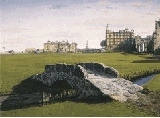Travel To Historic St Andrews, Scotland
St Andrews is a matchless blend of past and present. As a town it has no equal in Scotland. Its ecclesiastical connections began at least as early as 747; the burgh came into being about 1144; the University, the first in Scotland, began in 1411. Golf was a recognized game there in 1552.
The history of St. Andrews is crowded with incidents which punctuate the cavalcade of Scottish history, and the growth of Scottish institutions and culture, with the names of famous prelates, martyrs and reformers and their deeds to be found in all quarters of the town.
Of the many historical buildings of St. Andrews, first to be noted must be the Cathedral, which founded in 1160 and then consecrated in 1318, was by far the largest church in Scotland before its destruction at the reformation. The adjoining Priory was similarly the most important monastic foundation of its time. The Castle, founded in 1200 as a fortress and home of the Bishop of St. Andrews, possess the unusual feature of a bottle dungeon. From the Castle, Archbishop Beaton watched George Wishart burn at the stake, himself to perish at the hands of an assassin soon afterwards.
The United College, principal center of University life, stands on the site of St. Salvators College ( 1450 ) and includes the old tower and collegiate church. The ancient thorn close to St. Marys College is said to have been planted by Mary Queen of Scots. The University Library building contains the old hall in which the Parliament of Scotland met in 1645-46. These are but a very few of the colorful links with Scotlands brave past, and the whole is wrapped in a quiet awareness of the age-old pride and dignity which no other town in the country can hope to meet or beat.
For more than a hundred years St. Andrews has been famed as a holiday resort, not only on account of its golf, but also for its history, scenery and its equable and invigorating climate. It is almost unnecessary to say that the Royal & Ancient Golf Club is the premier golf club in the world. All the courses are an immense attraction to vacationers, and it is the ambition of every golfer to play on the world famous " Old Course."
There are many putting greens in different parts of the town, and abundant facilities for tennis, lawn bowling, swimming and boating. Indeed it is to be doubted whether there is in Britain a stretch of beach to equal the magnificent two-mile stretch at the West Sands. Almost equally appealing are the East Sands and Kinkell Braes, a stretch of rocky foreshore much enjoyed by young and old alike.
St. Andrews can best be seen on foot. Start at the old harbor and walk up to the Cathedral and Castle and the onwards to the " Old Course " and beach. A further walk up North Street, Market Street and South Street will provide the walker with an opportunity to visit most of the best sites in St. Andrews.
St Andrews is ideally located for easy trips to the East Neuk, North Fife, Dunfermline, Culross, Perth, Edinburgh, Falkland Palace, and all of historic Fife and Perthshire.
If you would like to visit this area as part of a highly personalized small group tour of my native Scotland please:
e-mail me today
Or why not visit my extensive
Travel Scotland
Web site at:
Travel Scotland
Home Page

